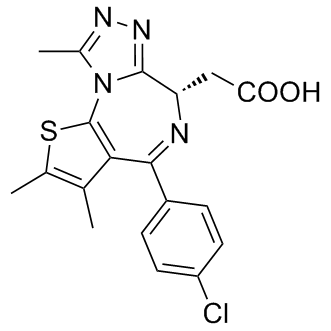All AbMole products are for research use only, cannot be used for human consumption.

JQ-1 carboxylic acid, a type of (+)-JQ-1 derivative, is a potent BET bromodomain inhibitor for downregulating PD-L1 expression on the surface of tumor cells. JQ-1 carboxylic acid can be used as a precursor to synthesize PROTACs, which targets BET bromodomains.
| Cell Experiment | |
|---|---|
| Cell lines | MC 11060 cells |
| Preparation method | Cells are seeded into white, 384-well microtiter plates at 500 cells per well in a total volume of 50 μL media. The 797, TT and TE10 cells are grown in DMEM containing 1% penicillin/streptomycin and 10% FBS. The Per403 cells are grown in DMEM containing 1 % penicillin/streptomycin and 20% FBS. Patient-derived NMC 11060 cells are grown in RPMI with 10% FBS and 1% penicillin/streptomycin. (+)-JQ1 is delivered to microtiter assay plates by robotic pin transfer. Following a 48 hours incubation at 37℃, cells are lysed and wells are assessed for total ATP content using a commercial proliferation assay. Replicate measurements are analyzed with respect to dose and estimates of IC50 are calculated by logistic regression (GraphPad Prism). |
| Concentrations | ~500 nM |
| Incubation time | 48 hours |
| Animal Experiment | |
|---|---|
| Animal models | Mice bearing NMC 797 xenografts |
| Formulation | 5% DMSO in 5% dextrose |
| Dosages | 50 mg/kg |
| Administration | intraperitoneal injection |
| Molecular Weight | 400.88 |
| Formula | C19H17ClN4O2S |
| CAS Number | 202592-23-2 |
| Solubility (25°C) | DMSO 30 mg/mL |
| Storage |
Powder -20°C 3 years ; 4°C 2 years In solvent -80°C 6 months ; -20°C 1 month |
| Related Epigenetic Reader Domain Products |
|---|
| dBRD9 dihydrochloride
dBRD9 dihydrochloride is a selective BRD9 PROTAC degrader. |
| BBC0403
BBC0403 is a selective BRD2 inhibitor with Kds of 7.64 μM and 41.37 μM for BRD2 (BD2) and BRD2 (BD1), respectively. |
| BAY-155
BAY-155 is a potent and selective menin-MLL tool inhibitor, with an IC50 of 8 nM. |
| FHT-1015
FHT-1015 is a potent SMARCA4/SMARCA2 ATPase (BRG1 and BRM) inhibitor with IC50s of ≤10 nM. |
| ISOX-DUAL
ISOX-DUAL is a dual CBP/BRD4 inhibitor with IC50 values of 0.65 μM and 1.5 μM for CBP and BRD4, respectively. |
All AbMole products are for research use only, cannot be used for human consumption or veterinary use. We do not provide products or services to individuals. Please comply with the intended use and do not use AbMole products for any other purpose.


Products are for research use only. Not for human use. We do not sell to patients.
© Copyright 2010-2024 AbMole BioScience. All Rights Reserved.
